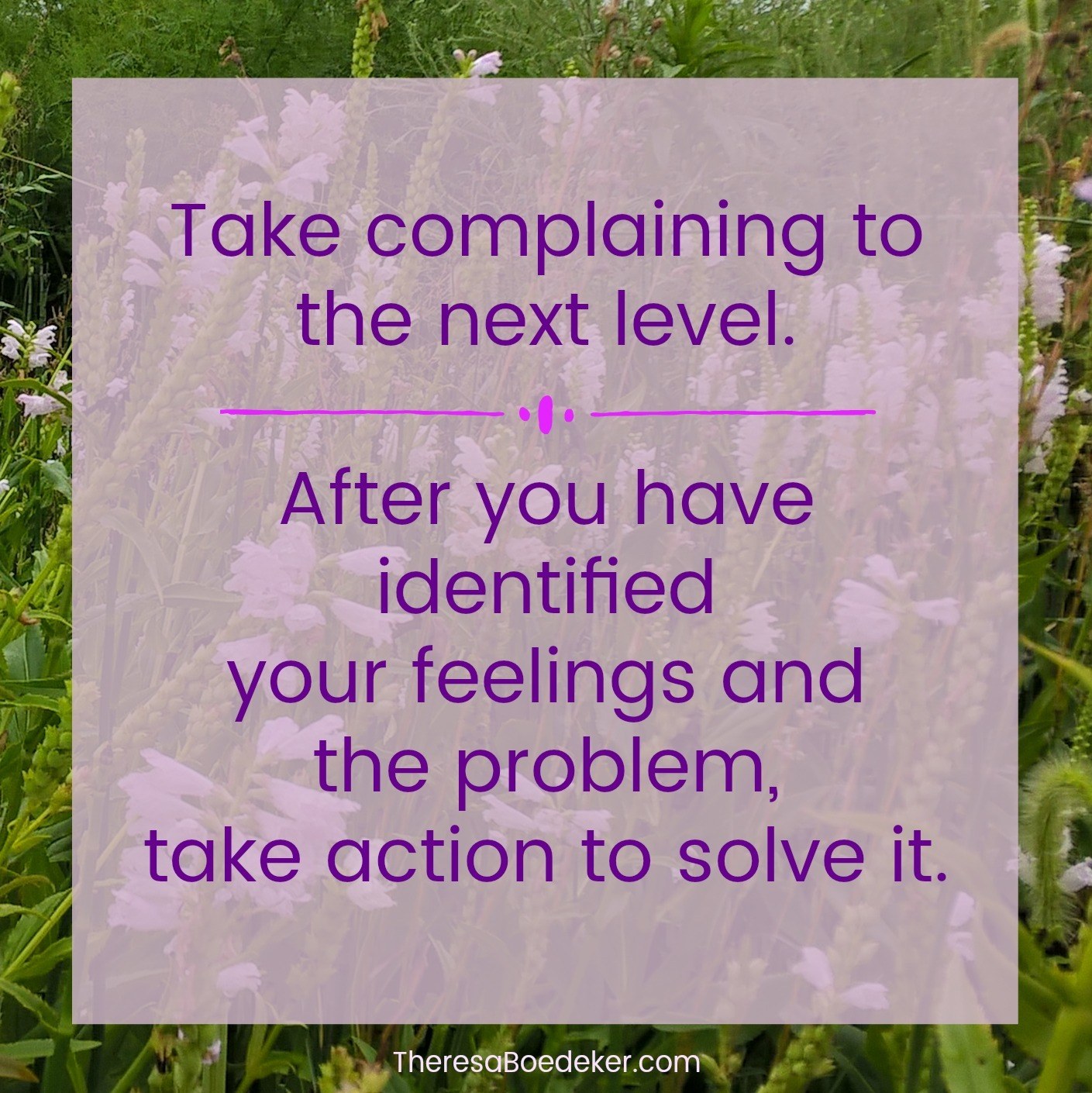It is so easy to slip into complaining.
Do you have this problem? Complaining more than you want?
I know that sometimes I am complaining, and I don’t even realize I am complaining. Other times I know I am complaining, but it is hard to stop until I have vented my frustration.
Anyone else raising their hand?
There seems to always be something to complain about. Big things and small things. Though I tend to favor small things.
How about you? Big or small things?


 It’s easy to complain.
It’s easy to complain.
I am trying to get ready and the phone rings. The bird needs to be put in her cage. Someone asks where their shoes are. I realize I haven’t yet brushed my teeth. And oh yes, what am I going to wear?
Stress builds. Frustration rises.
Then as we are leaving the house someone says, “I thought this started at 6pm.”
I look at the clock. It says 6:05.
I glance at the calendar. Yup, starts at six. Which means we needed to leave at 5:30.
In the car I complain about people distracting me. How I need people to take care of the bird and get themselves ready. And anything mildly related.
We arrive half an hour late, and in a bad mood, mainly because I have complained and vented.
I apologize, but we are all a bit somber. All because I mixed up the time to go and arrive as one in the same. And then complained to a car-captive audience.
That time it was my fault.
But sometimes it is not my fault.
I complain because it seems no one in my house can return an item back to its original and designated spot.
Or because I get tired of waiting for people to show up at the dinner table.
Or because my day has gone nothing like how I wanted it to.
Yup.
So many things to complain about.
In fact, the list seems never ending. We can complain about life, others, circumstances, our day, work, pets, health, politics, laws, food, movies, service, accommodations, traveling, technology, ourselves, and much more.
 Why we complain.
Why we complain.
We often complain because we have a sense of entitlement. We expect things to unfold orderly, and ultimately go a certain way. We expect (and think) people to act certain way. We expect (and think we deserve) to be treated a certain way.
In short. We complain because things, people, or life is not going as we expected.
I know. It sounds a little shallow of us, doesn’t it?
And it reveals our selfishness and that we are thinking mostly about our self.
Ugg. Not pretty, I know.
 The benefits of complaining.
The benefits of complaining.
I did say there were benefits of complaining, so let’s get to them.
1. Complaining can highlight the things that irritate us and identify what we consider to be a problem.
2. Complaining can help us label our feelings.
3. Complaining can illuminate the expectations we had for that situation or person.
4. Complaining can point out our self-focused heart.
In short, complaining can help us get to know ourselves better and shine a light into our motivations, feelings, attitudes, and expectations.
But how are these a benefit?
Has this ever happened to you?
You are complaining to your friend about your mate always being late. You are ready early, he has never been early to anything. And as you are describing your frustration about waiting for him and explain how you feel about arriving late to most things, you feel your blood pressure rise.
Presto! You’ve identified what you consider a problem.
You dislike being late. And he is late.
And you have begun to identify your feelings about this problem.
You hate waiting. You feel anger. Frustration. Annoyance. Maybe slighted because he doesn’t consider that you want to be early to events. Not late.
And if you were to probe further, you may find that waiting for him makes you feel disrespected. Not loved. Or maybe the cardinal rule in your childhood was never be late. So, you relate being late to breaking a rule of life.
See all the good information you have learned about yourself? {Stuff you can use to help you not get upset next time this predictable late dance happens again.}
Now let’s dig a little deeper.
You have looked at being late from your point of view, now let’s try to look at it from his viewpoint.
Your mate probably doesn’t see being late as a problem big enough to change. Or he probably wouldn’t be consistently late. Maybe he grew up in a family where they were always late. Or maybe he has no sense of time. Or maybe he has anxiety about being early.
Like I said, this is a problem to you. And why? Because it bugs you.
And it bugs you because you are an early bird married to a late bird. It bothers you because he is different than you. It bothers you because you hate being late. And in your rule book (your expectations), one needs to be early.
 Looking closer at the benefit of complaining.
Looking closer at the benefit of complaining.
Complaining has identified three important things we need if we are going to change or fix something in our life.
First, we need to identify the problem. We can’t change a problem without identifying it.
The more we can identify the things that irritate us, the better able we are to address those situations and take steps to not be irritated. We cannot take steps to prevent, sidestep, or change until we have identified a problem.
Second, we need awareness. We need awareness about how we feel, our actions, motivations, expectations, and personality. The more aware we are of how the problem makes us feel, act, and why we feel this way, than we can choose the next step and figure out what to do about the problem.
If we can identify our feelings, and work through them, we will rule them, instead of them ruling us.
Third, after gaining awareness of ourselves, we can gain awareness of others. After we look at the problem or situation from our point of view, we can step back and gain perspective by examining other viewpoints.
The more we can figure out the other person and why they act or think a certain way, the easier it is to give grace, understanding, and decide how to go about compromising and trying to solve the problem. Trying to understand their viewpoint also helps the situation be less of an I-am-right point of view, and they-are wrong point of view (or the winner / loser scenario). It also helps us not take their actions so personally.
We can also look at the problem or situation through the big picture of life and gain insight on how important the thing we are complaining about really is in the scheme of life.
 Complaining never solves a problem.
Complaining never solves a problem.
Usually we like to complain. Then after we have vented, we feel better.
Until next time.
But you see. Complaining never solves a problem. It takes no action.
My sister told me this one day and it made a big impression on me.
Complaining just exercises our tongue. And often it encourages us to shame and blame, or lecture, those involved, but there is no plan developed. No steps taken to alleviate or live with the problem.
It is time to take complaining to the next level. After we have identified the problem and our feelings concerning the problem, let’s take some action.
Let’s attempt to solve (minimize or deal with) the problem and eliminate further complaining.
 Solving the problem.
Solving the problem.
Here is the action part. The brain work.
It is time to reap the benefits of all that complaining and move to solving the problem. To quit being the victim and move to choices.
Back to the problem of the early bird and tardy bird. There are many choices available.
You can discuss it with him and tell him how his lateness makes you feel. You can come to a compromise. You can take separate cars. Maybe reward yourself with something enjoyable while he is taking so long to get ready. Tell him things start 30 minutes earlier than they really do. Decide to just overlook it and live with it. Catch yourself getting irritated and decide not to let it ruin your day. Catch yourself wanting to nag and complain him into moving faster, and instead name two things aloud to him that you appreciate about him.
The one thing you cannot do is change him. He has to do that himself.
The thing to remember is that you have lots of choices.
When we feel we have choices, we can quit complaining and instead choose to do something different.
Not all problems we complain about can be changed. Sometimes we need to find ways to deal with the problem in the best possible way. But we never get to dealing with the problem in a better way, until we identify the problem, our feelings associated with the problem, our expectations concerning the problem, and then take action to do or try something different.
I am not encouraging you to complain, but once you have, use the benefits (the knowledge learned) of complaining to your advantage.
Move to the next step of dealing with or solving the problem.
You’ll be happier, and so will those around you.
 P.S. Possible questions to ask yourself to help you solve your problem and benefit from complaining.
P.S. Possible questions to ask yourself to help you solve your problem and benefit from complaining.
1. What do I really feel about this topic / problem?
2. Why might I be feeling this way?
3. Why does this problem bother me so much?
4. What are my expectations for this problem? Why or how did I develop of choose those expectations?
5. What might the other person’s viewpoint be?
6. What might their expectations be?
7. What have I learned about myself (or them) that can help in the future?
8. Do I want to address this topic / problem with the person? What would be the best way of doing this?
9. How do I want to address, or react, next time this problem / situation comes up? (Come up with a plan of action.)
Helpful tip: Complain to a person who will listen, ask similar questions, and help you figure out your answers to these questions.
My sister and I call each other to complain, and then often we ask some of these hard questions of each other. This helps us identify the problem, and then decide what we are going to do about the problem.
Thanks for stopping by. Keep remembering what’s important.
Theresa
If you need some weekly encouragement and hope, tied up with some humor? Subscribe and join the journey. Life is sweeter when we walk alongside one another.
Join the Discussion: What are some benefits you have noticed about complaining?
 May link up at Holley Gerth (#coffeeforyourheart), Lori Schumaker (#Moments of Hope), Crystal Storms (#HeartEncouragement), Maree Dee (#Grace & Truth).
May link up at Holley Gerth (#coffeeforyourheart), Lori Schumaker (#Moments of Hope), Crystal Storms (#HeartEncouragement), Maree Dee (#Grace & Truth).


- How Knowing Your Husband Can Impact Him for Good - March 24, 2022
- How to Stop Focusing on What’s Wrong with You - March 9, 2022
- Is God Really Good All the Time? - February 24, 2022
Ah, you’ve hit on a tender nerve, Theresa … complaining comes far too easily for me, negativity can assail me at a moment’s notice. Thank you for speaking truth to one who needs wake-up calls on a regular basis. Bless you …
Linda, so glad to help. Complaining can come so easily. When I remember that it is not solving the problem, and instead realize that I can use the complaining to move towards action and choices, that helps me complain less. Changes the outcome of my complaining is a good goal.
I agree, complaining can be very easy to fall into. I like your suggestions for using those times when we feel like complaining to learn and to look more deeply into the reasons behind it. Also to look at what we can change rather than just complaining about what we can’t. Thanks for sharing!
Lesley, you said it beautifully.
Wow! You are spot on here. It IS important to be self-aware, but complaining doesn’t solve a problem. Recently I noticed that I would actually complain like a broken record when I felt my husband hadn’t really heard me. We’ve realized that when I’m intentional to express myself and he is intentional to listen, then my need for harping on something disappears. I feel heard and it helps me to let it go. But it took an action step to get there!
Betsy you are so right. When we feel heard our complaining diminishes. Sometimes I find when I am not being heard, I need to restate it in different ways before the person really hears me. But that does take effort and a little bit of creativity. Someone reminded me recently, that people who nag don’t feel heard. Which means when I find myself nagging and complaining, I need to intentionally express myself.
Gosh, complaining is easy…so easy. But taking it to the next level–love that. Food for thought and encouragement for those times when my lips so easily slip into complaints. Visiting from Kelly Balarie’s today.
Thanks for visiting, Kristi. I love that we can turn a negative into a positive with a little effort.
Wow did you thoroughly identify the problem and offer some great solutions! I am the late bird who married an early bird and I have found over the years there has to be give and take on both ends, but mostly that I need to make sure I start getting ready early so we avoid a lot of the issues you described. Great post!
Yes, ideally there needs to be give and take on both ends. I also am the late bird in our family. I am getting better and am often now the just-on-time bird. Well most the time, but just on time doesn’t always count with an early bird. Yup, so compromise. And noticing the effort of the other.